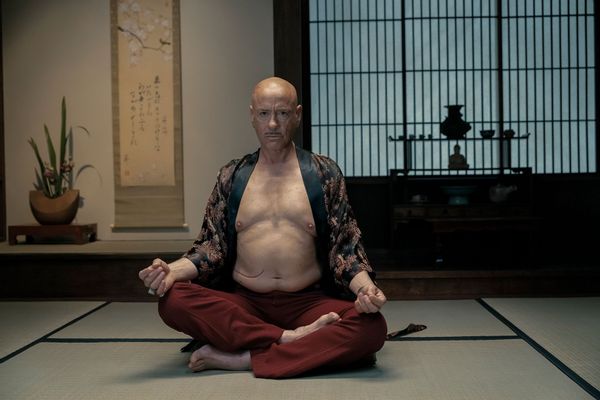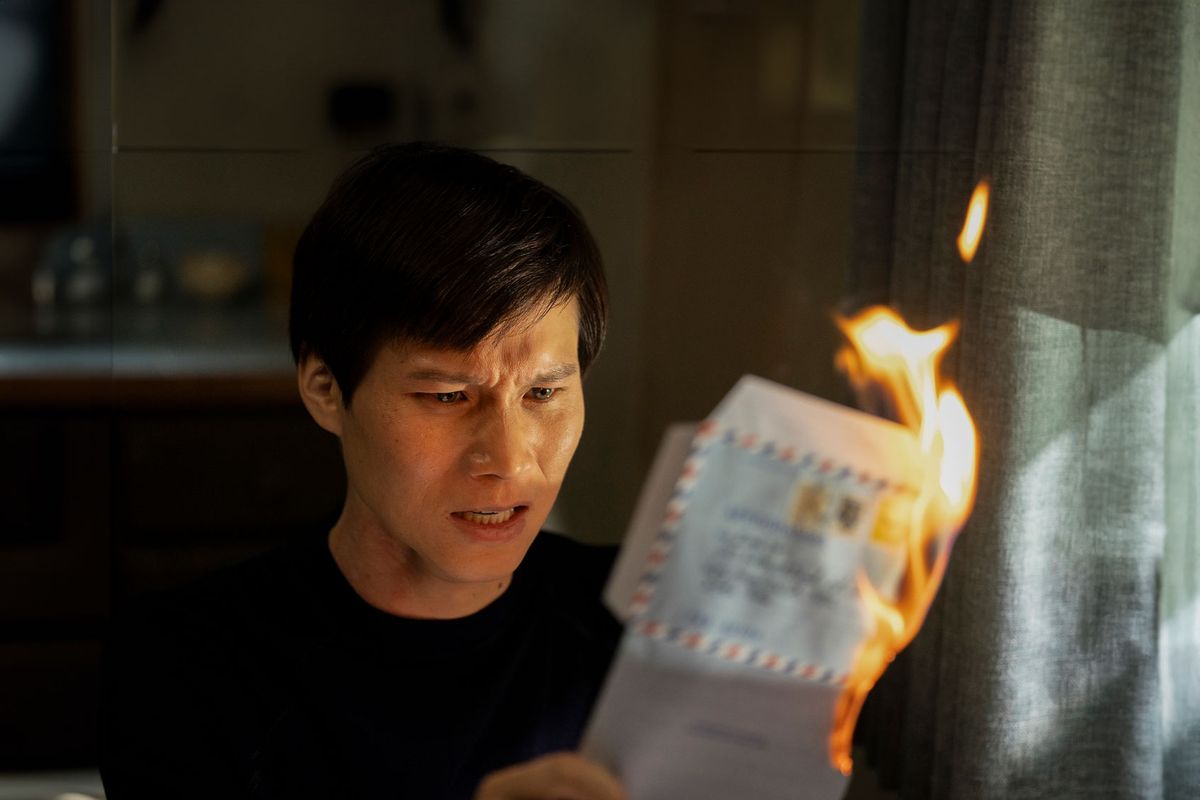War blurs clean-cut reasoning despite the concrete "one versus another" description. "The Sympathizer" reminds us of this in its opening frames, presented in the style of aged celluloid dated to the New Hollywood era alongside text that reads, "In America it is called the Vietnam War. In Vietnam it is called the American War."
One, other, good, bad, upside down, right side up? These quandaries battle within the Captain, the protagonist of Viet Thanh Nguyen's 2016 Pulitzer Prize-winning novel and our primary guide through six out of the seven episodes of Park Chan-wook and Don McKellar’s enthralling adaptation.
Nguyen writes the Captain as a measured, sardonic and angry figure defending his life to a faceless Commandant in a post-war re-education camp. Hoa Xuande, the Australian actor who brings him to life for the screen, captures his fatigue at enduring 12 months of interrogation and having to endlessly rewrite his "confession."
Captain claims to be exactly who he says he is at the novel's start, as well as the first line of his confession: "I am a spy, a sleeper, a spook, a man of two faces." He goes on to describe himself as being cursed to see every issue from two sides, setting the basis of Nguyen’s blackly comic inquiry of our understanding of not only this conflict but also the conflict raging within the Captain.
A blue-eyed half-French, half-Vietnamese communist mole who infiltrated the South's CIA-propped secret police, the Captain vividly writes and describes what he has done to serve Vietnam's cause — or betray it, as his interrogator believes — amid episodes that leap through time. The narrative rewinds by years, days, hours and occasionally seconds, portraying the Captain's memory as a fickle fiend that equally protects him and exposes his fraud.
He begins by running down the nature of his assignment to his American-backed boss, General (Toan Le), with whom he was ordered to leave Saigon in 1975, contrary to the Captain’s wishes.
 Robert Downey Jr. in "The Sympathizer" (Hopper Stone/HBO)
Robert Downey Jr. in "The Sympathizer" (Hopper Stone/HBO)
But our untrustworthy hero is also a double agent who keeps tabs on the General's activities on behalf of his CIA handler, Claude (Robert Downey Jr.), the slippery slimeball who trained him. At Claude's behest, once he arrives in Los Angeles, the Captain reconnects with his Orientalist grad school professor (also Downey Jr.), presses the flesh with a Reaganesque politician keen on supporting the Vietnamese community (guess who?) and takes a job as a consultant on a war movie directed by the Auteur.
Presenting Downey Jr. as at least four characters is one of Park's more inventive reworkings of the book. Not only does this escalate the feverish wackiness of the Captain's turbulent escapades in the America, but it also claws at our assumptions of what "The Sympathizer" is supposed to be.
"The Sympathizer" warns us that any singular view of a broad-scale event is undependable at best.
This series is a big swing for HBO, with much of the action conveyed in Vietnamese translated with English subtitles. A large accomplishment is the way Park and McKellar ferry the audience through Nguyen's intentional thematic tangles. "The Sympathizer" is a spy tale, a black comedy, a hazy war memoir and a coming-of-age story, to name a few genres it touches on. Park evokes all of this while maintaining an electrified focus on ordering the Captain's journey into pleasing progressions, like a jazz or funk solo on one of the many American soul songs he loves.
The series firmly roots in the specific effect colonization had on Vietnam, as well as the Captain, who at all times has to remind himself of his mother's assurance that he is "twice of everything," as the world in his internalized hatred haunts him with reminders that he will never be enough.
Ideological representatives populate "The Sympathizer"; few characters are only a mother, wife or lover. Several, including the Captain’s lifelong friends, Bon (a moving performance by Fred Nguyen Khan) and Man (Duy Nguyễn), are both. Bon is a true believer in the South's colonized version of democracy, who suffers greatly when Saigon falls.
We need your help to stay independent
Man and the Captain are secretly in league with the Communists, only Man has the honor of remaining behind to experience the victory for which they fought. Having one of his best friends as his Vietnam contact comforts the Captain until time and circumstances set him adrift, floating in a limbo point between the illusionary American dream, the dream of becoming American and the dream of returning to Vietnam and being embraced as Vietnamese.
"The Sympathizer" warns us that any singular view of a broad-scale event is undependable at best. America's view of Vietnam tends toward one perspective defined by Hollywood filmmakers. The Auteur, who dominates the fourth episode, represents this along with the damage such image-setting does to a people and country's reputation, as does the professor, a man so given to appropriation that he chastises his assistant California and raised assistant Sylvia Mori (Sandra Oh, both superbly understated and perhaps underutilized) for failing to be Japanese enough by his standard.
 Sandra Oh in "The Sympathizer" (Hopper Stone/HBO)Watching the newly-minted Oscar winner trippily evoke these types from underneath an assortment of prosthetics is distracting to a degree that may put off some people, which appears to be Park's strategy. Should the Auteur episode strike a few folks as more reminiscent of "Tropic Thunder" than "Apocalypse Now," that is probably deliberate.
Sandra Oh in "The Sympathizer" (Hopper Stone/HBO)Watching the newly-minted Oscar winner trippily evoke these types from underneath an assortment of prosthetics is distracting to a degree that may put off some people, which appears to be Park's strategy. Should the Auteur episode strike a few folks as more reminiscent of "Tropic Thunder" than "Apocalypse Now," that is probably deliberate.
If the goal is to critique America's careless white hegemony through several archetypes, casting the man who spent more than a decade playing a comic book billionaire military industrialist savior is an economic means of getting that point across. (David Duchovny is far more cartoonish, yet plausible, as a method actor who goes off the rails.)
Xuande's profoundly rich and emotionally agile work stabilizes this stylized and situational madness, defying the quotidian "sane man in an insane world" characterization by aiming for something more complicated. Through him, the Captain shifts between having a grip on his deceit and fraying under the uncertainty of it. Even when he is smoothly adjusting to whatever new abnormal lands in his lap, Xuande's eyes carry a flicker of uncertainty until at last, when the world is entirely off-kilter, he falls apart.
Want a daily wrap-up of all the news and commentary Salon has to offer? Subscribe to our morning newsletter, Crash Course.
This is foretold at the start, when the opening card quotes a phrase from "Nothing Ever Dies: Vietnam and the Memory of War," another of Nguyen's works. "All wars are fought twice," it reads. "The first time on the battlefield, the second time in memory."
Our titular character can't be relied on to precisely recall his homeland as it was, or his real self for that matter, but his heart and sorry soul don't lie. Regardless of the evil the Captain's paranoia and self-doubt drives him to do, you may still ache for him in the end, proving "The Sympathizer" successfully wins us over to its cause.
"The Sympathizer" premieres at 9 p.m. Sunday, April 14 on HBO and will be available to stream on Max.



Shares